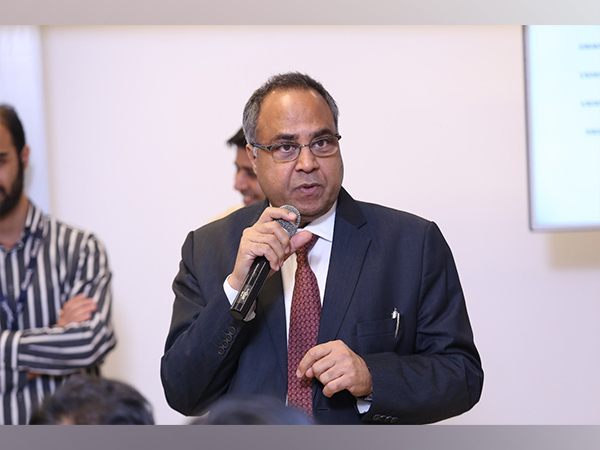
Alok Kumar Agarwal of Alankit Group talks about navigating cyber security challenges in the Fintech industry
Jan 24, 2024
ATK
New Delhi [India], January 24: Cybersecurity becomes complex as threats become more challenging to understand - Alok Kumar Agarwal Alankit. In recent years, India has witnessed an extraordinary surge in financial technology, catapulting the nation to the forefront of the global Fintech landscape. As a hub of innovation and digital transformation, the Indian Fintech industry is not only reshaping traditional financial services but also heralding a revolution in the way individuals and businesses engage with their finances. Remarkably, India proudly stands among the fastest-growing Fintech markets globally, promising a future of unprecedented opportunities and advancements.
The market size of the Indian Fintech industry reached $50 billion in 2021, and it is projected to soar to approximately $150 billion by the year 2025. Another data by the Economic Survey 2023, reveals a swift and widespread adoption of Fintech products among Indian consumers. Citing the most recent Global Fintech Adoption Index, the survey highlights that a remarkable 87% of Indians have embraced Fintech, surpassing the global average of 64%. This exponential growth and popularity underscores the sector's momentum and unprecedented technological advancement.
As India's Fintech industry experiences rapid digital transformation, it grapples with a host of cybersecurity challenges that demand vigilant attention. Emphasizing the importance of data security, Alok Kumar Agarwal Alankit says, "The interconnected nature of digital financial services exposes the sector to a spectrum of threats, ranging from data breaches to sophisticated cyber-attacks. Fintech companies, dealing with sensitive customer information and financial transactions, are prime targets for malicious actors seeking unauthorized access and financial gain."
The increasing sophistication of cyber threats, coupled with the expanding attack surface of evolving technologies, poses a formidable challenge for robust cybersecurity.
As per the 2023 India Threat Landscape Report released by the Singapore-based cybersecurity firm Cyfirma, India has emerged as the primary target for cyber-attacks worldwide, bearing the brunt of 13.7% of all such incidents.
These statistics paint a scary picture for India. So, to get into the core of the problem, we need to understand what kind of challenges are faced in cyber security.
A pervasive lack of awareness and education among individuals and organizations is one of the root causes. Many in the country remain inadequately informed about the risks and consequences of cyber-attacks, rendering them susceptible to exploitation. This knowledge gap is particularly pronounced among smaller businesses and startups with limited resources for robust cybersecurity measures.
Additionally, India grapples with a shortage of skilled cybersecurity professionals despite a growing demand for expertise in the field.
Recent data from the Indian Computer Emergency Response Team (CERT-In) shows that cybercrime is becoming more troublesome. Compounding this threat is the anticipated shortage of around three million cybersecurity personnel in India by the end of 2023. This shortage presents a significant hurdle for organizations, making it more difficult for businesses and firms to effectively manage their cybersecurity posture and respond promptly to emerging threats.
"Among the most notable cases of cyber security breach was when the servers of India's All India Institute of Medical Science (AIIMS) were targeted, resulting in the compromise of approximately 40 million health records and triggering a two-week-long system outage, shares Alok Kumar Agarwal Alankit. AIIMS did eventually thwart other attempts of the breach, however, the threat looms constantly.
Another major beach happened recently when sensitive details of 81.5 million Indian citizens, including Aadhaar numbers, passport information, phone numbers, and addresses were stolen. The actor behind the data breach alleges that the information extracted from citizen's COVID-19 test details originated from the Indian Council of Medical Research (ICMR).
"India has no dearth of talent in the IT field. The government ensures that this talent is not wasted. With a constant rise in users of Fintech apps, the businesses and the government need to have robust protocols and measures in place to counter breach." States Alok Kumar Agarwal.
The government has recognized the threat and is carrying out measures to counter it. The Ministry of Electronics and Information Technology (MeitY) has been granted a budgetary allocation of Rs625 crore, earmarked specifically for cybersecurity initiatives. This financial allocation is intended to support various cybersecurity projects and will play a crucial role in enhancing the capabilities of the Indian Computer Emergency Response Team (CERT-In), the country's primary cybersecurity response unit. This substantial funding underscores India's dedication to strengthening its cybersecurity infrastructure however, a lot more needs to be done.
Alok Kumar Agarwal Alankit believes that the Fintech industry should approach the cybersecurity challenge with utmost seriousness, given its handling of substantial volumes of sensitive data. Technology, while a vital engine for growth, comes with a dual nature--it can be a powerful force for advancement and, if not handled with care, poses potential risks to a country's economy. It is important to recognize and address this delicate balance, especially for nations like India that are aspiring for global leadership.
(ADVERTORIAL DISCLAIMER: The above press release has been provided by ATK. ANI will not be responsible in any way for the content of the same)









